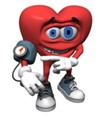Understanding Hypertension
This site is designed to help you understand high blood pressure, or hypertension, and learn the best ways to manage it.
Introduction
There are a number of things that you can do to help control your blood pressure and this site will help you understand how you can help. Keep in mind that:
- This site has a lot of information and you will learn more each time you read it…take your time!
- Your health care provider can answer any questions you have.
- It will take time to make changes.
Most importantly, remember that when you work with your health care team to make changes with your medicines and lifestyle, you will be improving your heart and kidney health in addition to your general health and wellness.
What is hypertension?
Hypertension is the medical term for high blood pressure.
What is blood pressure?
Blood pressure refers to the pressure that blood applies to the inner walls of the arteries. Arteries carry blood from the heart to other organs and parts of the body.
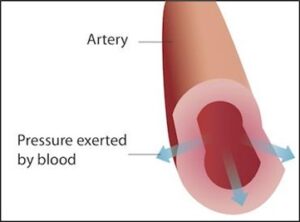 Your blood pressure gives you information about how well your heart is working and what condition your arteries are in. For example, when the amount of blood your heart pumps out increases or your arteries become stiff, your blood pressure increases.
Your blood pressure gives you information about how well your heart is working and what condition your arteries are in. For example, when the amount of blood your heart pumps out increases or your arteries become stiff, your blood pressure increases.
What are the symptoms of hypertension?
Hypertension does not usually cause symptoms. That is why it is important to have routine monitoring of your blood pressure to determine whether it is high.
How do I know if I have high blood pressure?
Blood pressure can be measured in your health care provider’s office, at home, or even at your local pharmacy or grocery store. Blood pressure is measured with a device called a sphygmomanometer. Blood pressure is recorded in millimeters of mercury (mmHg).
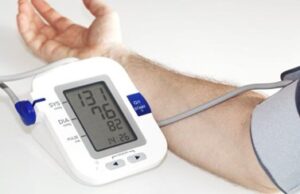 There are two types of blood pressure monitors: manual and digital.
There are two types of blood pressure monitors: manual and digital.
- Manual blood pressure monitors require a stethoscope and are used by trained personnel in the office setting.
- Digital blood pressure monitors (like the picture to the right) do not require specialized training or a stethoscope. Because they are easier to operate, digital monitors are a good option for home use.
What do the numbers mean?
Your blood pressure is made up of two numbers. For example, your health care provider may tell you that your blood pressure is “150 over 90.” The first (or top) number is called the systolic pressure. This is the pressure inside your arteries when your heart is contracting (at the time of a heart beat). The second (or bottom) number is called the diastolic pressure. This is the pressure inside your arteries when your heart is relaxed (between heart beats).
Blood pressure is reported as the systolic over diastolic pressure, as illustrated BELOW. Both numbers are important. As we get older, blood vessels usually become stiff or rigid, so that they are less able to dilate or expand when blood enters from the heart. Therefore, the systolic pressure (top number) usually increases with age.
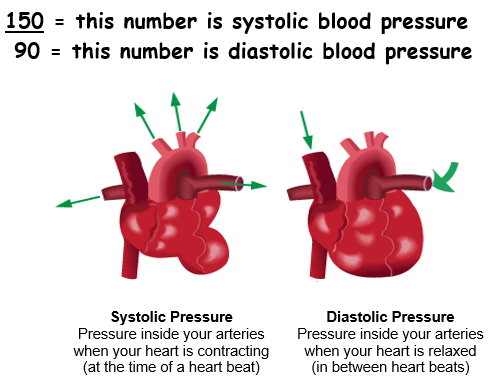
Normal blood pressure is below 120/80. If your systolic pressure is 120 to 129, and your diastolic pressure is less than 80, you have “elevated blood pressure”. A blood pressure above 130/80 is considered hypertension, or high blood pressure. Ask your health care provider for guidelines on what a high blood pressure is for you and what your target blood pressure goal should be.
What other diseases are related to hypertension?
High blood pressure is a condition that puts you at risk for heart attack, stroke, heart failure, and kidney disease. Untreated high blood pressure increases the strain on the heart and arteries, and eventually damages the heart, brain, and kidneys.
What causes hypertension?
Hypertension is very common, especially as people grow older. For example, hypertension occurs in about 2 out of 3 people over the age of 60 years.
Most adults have “primary hypertension,” which means that the cause of high blood pressure is not known. A small subgroup of adults (about 5 out of every 100) has “secondary hypertension,” which means that there is an underlying and possibly correctable cause of the high blood pressure, usually a kidney or hormone disorder. Your healthcare provider will determine if you have a treatable cause for your high blood pressure.
You have (circle one):
![]()
It is believed that primary hypertension is affected by genetics (heredity), obesity, high salt intake and emotional stress. The following factors sometimes also play a role in the development of high blood pressure: excessive alcohol use, smoking, sleep apnea, some herbal remedies, diet pills and other stimulants, and lack of physical activity.
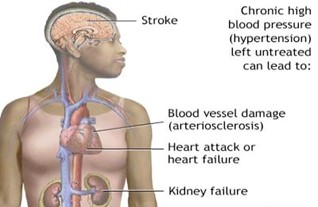
Can hypertension be cured?
Hypertension usually cannot be cured. Sometimes, people who lose a large amount of excess weight, or greatly lower their use of alcohol and/or salt in their diet, and greatly reduce excess stress, may see their blood pressure return to a normal level.
How is hypertension treated?
Treatment of hypertension always includes improving lifestyle habits, including:

In addition, most patients with high blood pressure have medications prescribed by their health care provider. Following the lifestyle changes listed above can help blood pressure medicines to work better.
Important things to do every day
If your health care provider has prescribed medicine to lower your blood pressure, the most important thing that you can do is to take it as instructed. If the medicine causes side effects, do not stop taking it without talking with your healthcare provider about the side effects you are having. Your dose may be lowered, or the medicine may be changed. If the cost of your medicine is a problem, please tell your healthcare provider. Your provider can change the medication or help you enroll in a medication assistance program to help cover the cost of the medication. Taking your blood pressure medicine can help prevent you from having a heart attack or stroke and can even save your life!
What else can you do?
In the past, only blood pressure measurements made in the health care provider’s office were used to determine whether your blood pressure was under control. Now, home measurements with a battery-operated, semi-automatic device can be used to regularly measure blood pressure. Home blood pressure measurements help your health care team determine whether your medications need to be changed. Research has shown that people who measure their blood pressure at home and report the results to their health care provider have better blood pressure control.
